Understanding the nutritional needs of chickens is crucial for their growth, health, and productivity. Boost egg production with these tips!
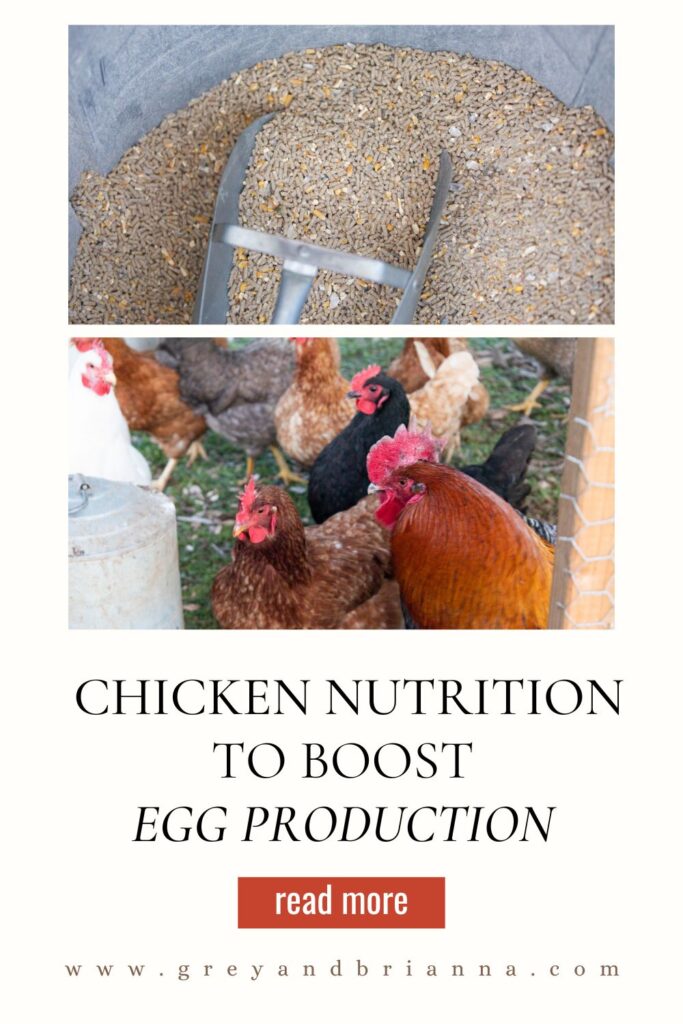
Chickens require a balanced diet comprising proteins, carbohydrates, fats, vitamins, minerals, and water. The specific nutritional demands vary based on the chicken’s age, breed, and purpose, whether for egg laying or meat production. For instance, layers need a diet higher in calcium to support shell formation, while meat breeds require more protein to facilitate rapid muscle growth.
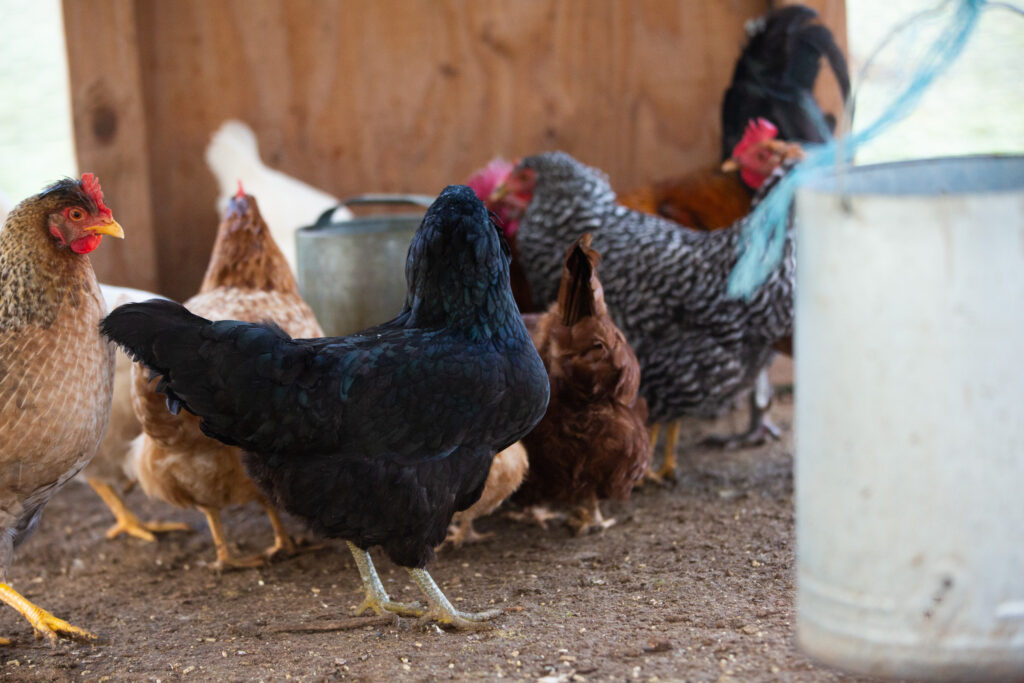
Commercial feeds are formulated to meet these varied requirements, providing a convenient solution for poultry farmers. However, those opting for alternative feeding strategies must ensure their feed mixture meets all nutritional benchmarks. Adequate nutrition not only optimizes the bird’s performance but also strengthens its immune system against diseases.
Managing the feed intake of chickens is equally important as the diet composition. Overfeeding can lead to obesity and associated health problems, while underfeeding can result in malnutrition and reduced productivity. Water intake must be monitored as well, as it plays a vital role in the digestion and absorption of nutrients, and is particularly critical during periods of growth and egg production.
Basic Nutritional Needs of Chickens

Chickens require a balanced diet comprising specific nutrients to maintain optimal health and production. This diet must include a mix of macronutrients, micronutrients, and water.
Macronutrients
Macronutrients are the primary source of energy and are vital for growth, reproduction, and overall health. For chickens, these include:
- Proteins: Essential for muscle development and repair. Chickens often receive protein from sources like soybean meal and meat byproducts.
- Carbohydrates: Provide energy and are found in grains like corn and wheat.
- Fats: Supply concentrated energy and help absorb vitamins. Sources include vegetable oils and animal fats.
- Fiber: Important for digestive health, fiber comes from ingredients such as oat hulls and wheat bran.
Micronutrients
Chickens also need micronutrients in smaller amounts, which are crucial for various physiological functions:
- Vitamins: Necessary for immune function, energy metabolism, and bone health. For instance, Vitamin A is critical for vision and Vitamin D for calcium absorption.
- Minerals: Elements like calcium and phosphorus are vital for bone development, with calcium also being essential for eggshell production. Trace minerals such as zinc, manganese, and selenium are important for enzyme functions and overall health.
Water
Water is perhaps the most crucial nutrient for chickens, necessary for:
- Maintaining hydration and body temperature
- Nutrient transportation and metabolic processes
- Digestion and excretion Water intake must be clean and accessible at all times to ensure chickens remain hydrated and healthy.
Feed Types and Composition
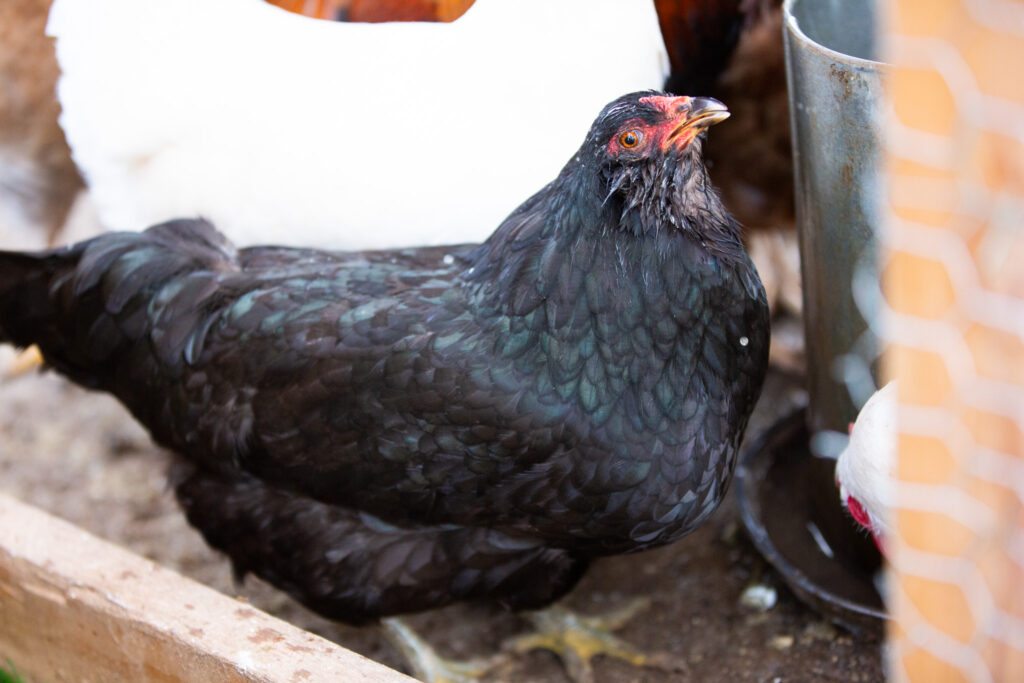
In poultry nutrition, the composition and type of feed are crucial for the health and productivity of chickens. They require a balanced diet that meets their nutritional needs at various stages of life.
Commercial Feeds
Commercial feeds are specifically formulated to meet the nutritional requirements of chickens. These feeds are categorized by the age and purpose of the chickens, such as starter for chicks, grower feeds for growing birds, and layer feeds for egg-laying hens. The composition of these feeds includes a mix of:
- Grains like corn and wheat for energy
- Proteins from soybean or fishmeal for muscle development
- Vitamins and minerals to support overall health
- Fats for energy and essential fatty acids
| Type | Grains | Proteins | Fats | Vitamins and Minerals |
|---|---|---|---|---|
| Starter Feed | High | Highest | Low | Balanced |
| Grower Feed | Moderate | Moderate | Moderate | Balanced |
| Layer Feed | Moderate | Lower than starter | Higher | High in calcium |
Alternative Feeds
Alternative feeds can be used to supplement or replace commercial feeds when necessary. These may include:
- Grains: Barley, oats, or rye as energy sources
- Legumes: Peas or lentils for protein
- Forage: Clover or alfalfa for additional nutrients
- Kitchen scraps: Fruits, vegetables, and grains to reduce waste and provide variety
Note: The use of alternative feeds should be monitored closely to maintain a balanced diet.
Feed Supplements
Feed supplements provide additional nutrients that may not be sufficiently available in the main feed. These include:
- Calcium sources such as oyster shell or limestone for strong eggshells
- Grit to aid digestion
- Probiotics for a healthy gut flora
These supplements should be provided based on the specific needs of the flock, considering factors such as age, health status, and production purpose.
Feeding Strategies
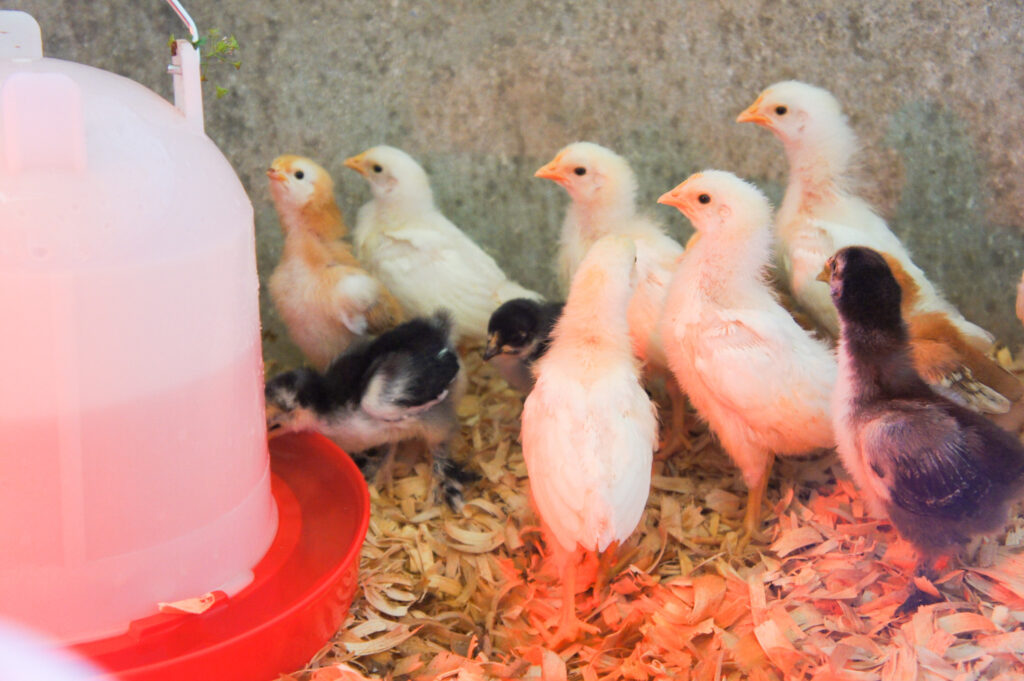
Effective feeding strategies are critical for optimal growth, health, and productivity of chickens. These strategies vary based on the chicken’s life stage and the type of farming method implemented.
Life Stage Feeding
Chickens have distinct nutritional needs at different stages of their life. Starter diets are high in protein and essential for chicks from 0 to 6 weeks to support rapid growth. Transitioning to a grower diet from 6 to 20 weeks includes a balanced intake of protein, energy, vitamins, and minerals. Layers require a layer diet, which is calcium-rich to support eggshell formation from the 20-week mark onwards.
Free-Range vs. Conventional
Feeding methods diverge significantly between free-range and conventional systems. Free-range chickens forage for a portion of their diet, often supplementing with insects, seeds, and vegetation. They typically require less feed input due to natural foraging behaviors. Conversely, chickens in conventional systems rely heavily on formulated feed to meet their nutritional needs, as their environment lacks the access to a diverse range of food sources.
Nutritional Disorders and Health
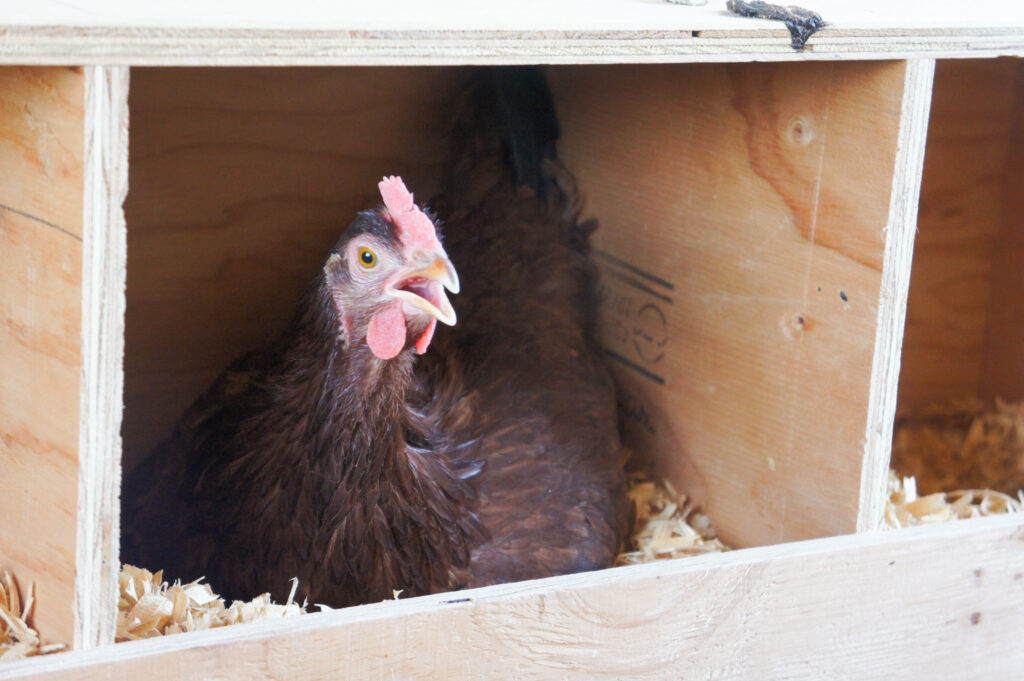
Proper nutrition is crucial to prevent a range of disorders in chickens. By understanding and addressing nutritional needs, one can ensure the health and productivity of their flock.
Deficiency Diseases
Deficiencies in essential nutrients can lead to various health problems in chickens. For instance, a lack of Vitamin A can cause poor growth, weak immunity, and reproductive issues. Meanwhile, calcium and phosphorus deficiencies often result in weak bone development and reduced eggshell quality, evidenced through rickets in young chickens and osteoporosis in laying hens.
Toxicities and Imbalances
Chickens can suffer from toxicities if their diet contains harmful levels of certain elements. An excess of selenium, for example, may cause weakness, respiratory distress, and even death. Similarly, an imbalance of calcium to phosphorus ratio, particularly when calcium is excessively high, can interfere with the absorption of other minerals and lead to nutritional imbalances.
Managing Health through Nutrition
Careful management of a chicken’s diet can prevent nutritional disorders. Including a balanced mix of proteins, carbohydrates, fats, vitamins, and minerals in the appropriate ratios is vital. For laying hens, diets must be formulated with higher calcium levels to support eggshell production. Implementing a consistent feeding schedule and ensuring access to clean water also form part of good nutrition management practices.
Regulations and Standards
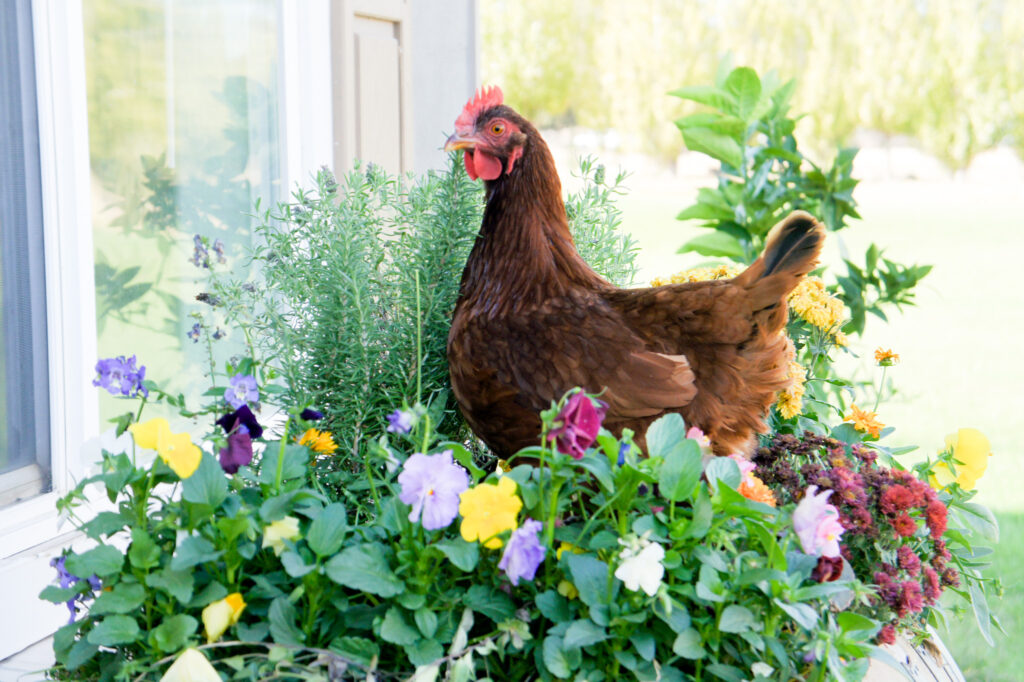
Regulatory bodies establish strict guidelines to ensure the nutritional needs of chickens are met, focusing on feed quality control and the use of organic and non-GMO feeds.
Feed Quality Control
Feed quality control is crucial in the poultry industry to maintain the health and productivity of chickens. The Food and Drug Administration (FDA) oversees feed quality by enforcing the Food Safety Modernization Act (FSMA), which mandates those involved in the manufacturing, processing, and handling of animal feed, including chicken feed, adhere to specific regulations:
- Ingredient Verification: Feed mills must source ingredients from reputable suppliers and verify that they meet nutrient specifications.
- Manufacturing Practices: The FSMA requires adherence to Current Good Manufacturing Practices (CGMPs) to prevent feed contamination.
- Hazard Analysis: Feed manufacturers must perform a hazard analysis to identify potential risks and implement preventive controls.
- Record-Keeping: Manufacturers must keep detailed records of feed formulation and safety measures.
Organic and Non-GMO Feeds
Organic and Non-GMO feeds are increasingly sought after to meet consumer demand for poultry products labeled as organic or non-GMO. The United States Department of Agriculture (USDA) through its National Organic Program (NOP) sets the standards for what constitutes organic feed:
- Organic Feed Requirements: Feed must be composed of agricultural products that are 95% or more certified organic, containing no synthetic additives or genetically modified organisms (GMOs).
- Non-GMO Verification: The Non-GMO Project offers third-party verification for products, including chicken feed, which must not contain more than 0.9% GMOs to meet their standard.
Environmental Factors Affecting Nutrition
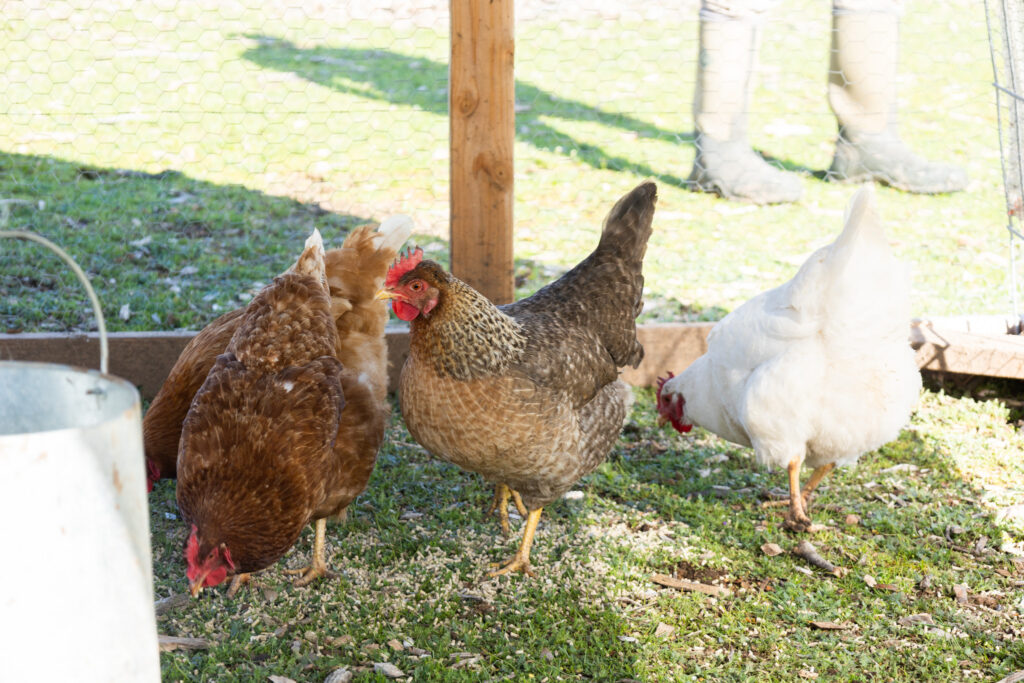
The nutritional requirements of chickens are notably influenced by environmental factors, such as the changing seasons and the conditions of their housing. These elements play a critical role in determining the specific dietary needs to maintain optimal health and productivity.
Seasonal Variations
Climate and seasonality significantly dictate a chicken’s caloric and water intake. During colder months, chickens require more calories to maintain body heat, leading to an increased demand for energy-rich feed. Conversely, in the heat of summer, they seek lighter feed and increase their water consumption to avoid heat stress. Their diet should be adjusted accordingly to compensate for these shifts:
- Winter: Higher energy feed (more carbohydrates and fats)
- Summer: Higher water content, electrolyte balance, reduced energy density
Housing and Space Influences
The size and quality of the space where chickens are housed can affect feed intake and overall nutrition. Overcrowding may lead to competition for food and result in uneven feed distribution among the flock, which can lead to nutritional deficiencies in some birds. On the other hand, ample space allows for better access to feeders and a more uniform intake of the diet provided. Adequate ventilation and temperature control within the housing also ensure the flock does not suffer from stress that could affect their eating behavior and absorption of nutrients.
Considerations for optimal chicken nutrition in relation to housing include:
- Space Allocation: Ensure enough feeder space (at least 4 inches per bird)
- Ventilation: Proper airflow to reduce ammonia and dust levels
- Temperature Control: Maintain moderate temperatures conducive to natural feeding behaviors
Related Articles:
Building a Chicken Tractor: Essential Guide for Easy Mobility
How to Build a Hoop Chicken Coop
What is an Easter Egger Chicken?
Starting a Homestead From Scratch: How to Build Your Self-Sufficient Oasis
Pin it for Later!


Leave a Reply